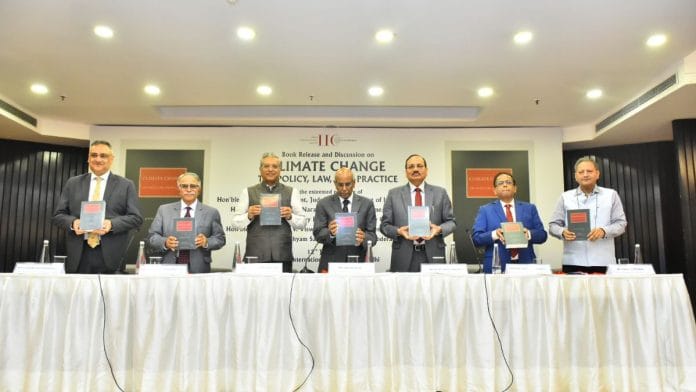New Delhi: The Covid-19 pandemic affected all aspects of people’s lives and upended the global economy. But it was also during this period that the skies, especially over the national capital, turned blue again after a long time. For advocate Jatinder Cheema, this was an inspiration to write a book and motivate others to do their bit for the environment.
Cheema’s book, Climate Change: The Policy, Law, and Practice, was launched at the Kamaladevi Complex of the India International Centre (IIC) on 12 July. The event aimed to inspire hope and encourage efforts to conserve nature, but it began on a bleak note.
Shyam Saran, former foreign secretary and IIC president, who moderated the first half of the launch event, painted a rather gloomy picture of the planet’s future.
“Climate change is here to stay, regardless of whether India or even global carbon emissions magically become zero,” he said.
Saran attributed this to the lack of advanced and economically viable carbon capture technologies needed to reduce the high levels of greenhouse gases accumulated in the atmosphere.
His perspective was in stark contrast to the author’s vision, who saw the opportunity to write the book during one of the darkest times of the 21st century.
“Seeing clear blue skies for the first time in a long while, hidden due to air pollution, as the world grappled with the unprecedented challenges of the Covid-19 pandemic inspired me,” Cheema said.
Through his 800-page book, Cheema thoroughly addresses the issue of climate change. Besides providing a basic understanding of the phenomenon, its associated dangers, and major drivers, the book also offers solutions for tackling the challenges of climate change at the community, technological, and legislative levels.
Apart from the author’s family and friends, who somewhat balanced the skewed gender ratio in the hall, the book launch was attended by several dignitaries, including ambassadors, high commissioners, policymakers, legal professionals, and environmentalists.
Also read: Climate change adding 50 to 80 warmer nights each year to Indian summers, study finds
Whose responsibility is it?
The panel included Supreme Court judges such as Justices Surya Kant, PS Narasimha, Sanjay Karol, and KV Viswanathan. While they agreed on the seriousness of climate change and the problems it presents, they were divided on the measures to combat it. One perspective emphasised the importance of a robust legal framework, while the other focused on individual efforts.
Much like his contemporaries, Justice Viswanathan lauded the book’s timeliness. He was particularly fascinated by how the book addresses the extensive body of national and international jurisprudence related to combating climate change.
“In recent times, legal battles have shifted from environment vs development to environment vs conservation,” he remarked.
This concern has been well addressed by exemplary decisions made by the Indian judiciary, such as in the MK Ranjitsinh v. Union of India case, where the Supreme Court prioritised the conservation of the Great Indian Bustard and protected citizens’ rights against the adverse effects of climate change.
Viswanathan also recognised the need to develop new tools to make legislation more stringent in enforcing the nation’s commitments to climate change.
In his closing remarks, he said, “I agree with Cheema’s suggestion to establish a Climate Change Commission for our country, much like NITI Aayog, where stakeholders and committee members periodically address this issue, push frontiers, and solve problems from all angles.”
The other panellists—Surya Kant and Narasimha—held a different view, asserting that the responsibility for preventing climate change lies with individuals rather than the state or the nation.
“It is not a national affair, but an individual one,” said Justice Narasimha.
He urged the audience to reduce their carbon footprint, citing Kerala’s ‘No Iron Day’, where people avoid ironing clothes for a day to cut electricity use from thermal power plants. He emphasised the need for individuals to restore the balance in nature by retracing their steps and learning to live in harmony with the environment.
Sanjeev Chopra, former director of the Lal Bahadur Shastri National Academy of Administration and moderator of the second half of the session, shared his success in addressing climate change.
He mentioned that he wrote to air conditioning companies like Blue Star, urging them to stop advertising ACs running at 18 degrees and instead promote a more comfortable and less energy-intensive 25 degrees. Following this, major air conditioning companies reportedly adjusted their advertising strategies.
(Edited by Aamaan Alam Khan)






